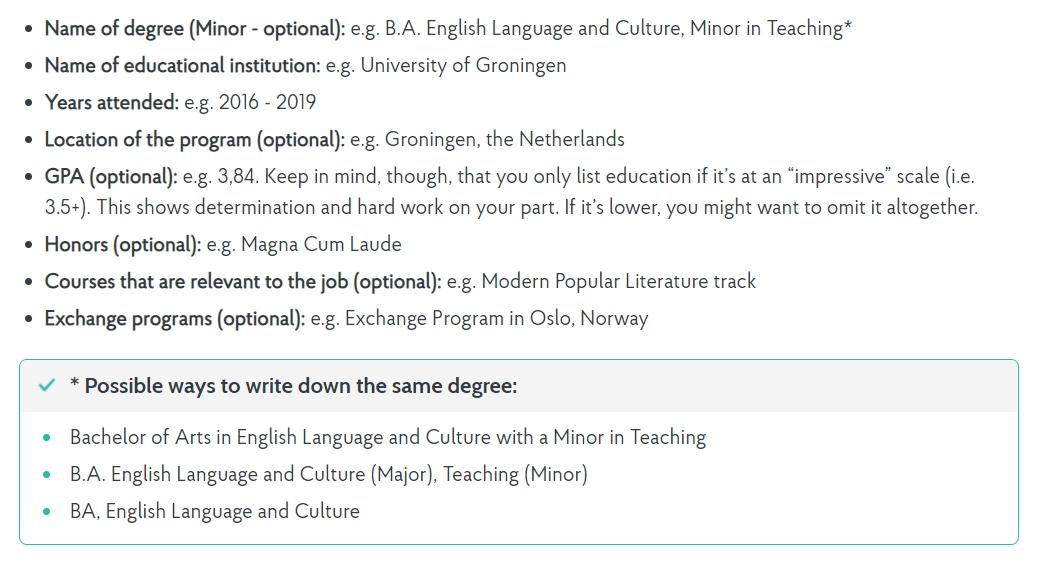Adding Your education
It’s common to include your education on your resume, especially if you are applying to a job that requires a degree. If you’re a few years into your career, your resume’s education section can be minimized at the bottom of your resume.
- Name of Institution
- Degree
- School Location
- Years Attended


If you’ve recently graduated college, your education section goes above your work experience and includes more detail. Skills developed in school are real skills that have value in the professional world. Recent grads can include relevant coursework, societies, organizations, and extracurriculars that strengthen their candidacy.
Awards, Accolades, and Certifications can be embedded in the work experience and skills sections of your resume. However, if you would like to highlight them, they could warrant a section of their own. Either way, relevant certifications and honors will increase your credibility.
-
Format is key
The reverse chronological format is the best choice for most education sections. Start with your recent academic achievement. College students pursuing a degree should write “anticipated completion date.”
-
Include keywords
Write about your academic credentials using specific keywords listed in the job description. Hiring managers and applicant tracking system software will discard resumes that lack them.
-
Avoid aging yourself
Your writing shouldn’t immediately show your age. Just include the type of degree and university. Your GPA is not relevant. If you’ve attended several schools, focus on education that is pertinent to the job.
-
Include your honors
Write about earned honors, such as summa cum laude, or leadership roles. Many recruiters value this type of experience over the specifics of your degree. This is important for recent college graduates and high students with little work experience.
-
Pay attention to required credentials
Include required credentials in writing of your resume education section. Many industries, such as finance, healthcare, social work, and IT, require specific education and certifications.
-
Industry dictates section placement
If you seek employment in education, science, or law, place your resume education section near the top of the page. Remember to begin with your highest degree attained.
-
Advanced degrees require more information.
When writing about a doctoral degree, include the name of your academic advisor, dissertation subject, and the date it was published that name of the scholarly journal.
-
No degree, mention training
If you don’t have a degree, write about your continued learning, special training or certifications. For example, if you’ve completed an apprenticeship relevant to the job title, place this information in your resume education section.
-
Never embellish
Never embellish the writing in your resume education section. A hiring manager may verify your credentials, so be honest about colleges attended, academic achievements, training, and certifications.
-
No flippant writing
Skip the cutesy, flippant writing workarounds, such as “recent graduate from the school of life.” If you don’t have formal schooling to include, beef up your skills and work history section.
Note:Adding a study abroad semester or year to your resume can show employers that you’re a go-getter. This information doesn’t need to take up much space, and should be included in the education section as well.
The correct place to put study abroad on your resume is just below the university you graduated from.